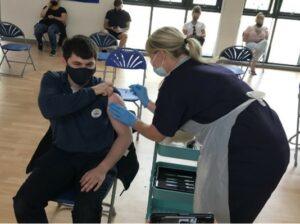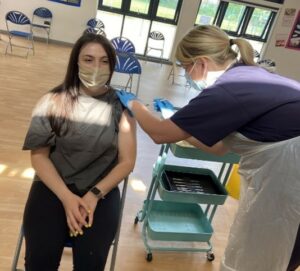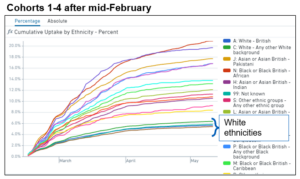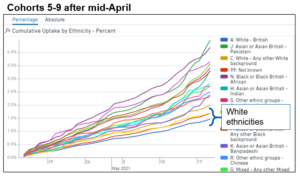North West COVID-19 vaccination programme newsletter – Issue 10
Dear colleagues,
WOW! We have now given more than eight million vaccinations to protect our population against COVID-19, including 4.7 million first doses and 3.5 million second doses.
Some of this is due to our wonderful weekend of walk-ins (WOW) from 17 to 20 June, during which more than 150,000 vaccinations were delivered. I made this film to thank everyone involved in WOW. Let me say here what I say in the film – thank you so, so much for everything you are doing to protect lives.
Our WOW weekend helped to galvanise further uptake and was also an opportunity to extend reach for our local communities. Happily, it coincided with the opening up of vaccinations to all adults, enabling us to widen the group we could target.
Young men in Greater Manchester who had not committed to a booked slot came to our walk-ins in large numbers for their first COVID-19 vaccination. Alongside them were people having their accelerated second doses, and people from our most vulnerable groups coming for their first dose, which is so important. It was a real mix of ages, of ethnic groups, and of booked and walk-in appointments, and it was so inspiring to see the energy and enthusiasm of everyone involved.
Townsend Medical Centre’s amazing team gave 2,700 vaccinations in one day at Anfield, reaching out into the deprived communities who live near the football ground. A vaccination bus in Speke, another deprived community in Liverpool, saw family groups coming to be vaccinated together, on Father’s Day, in what could be the best gift ever for their dads.
And hyper-local pop-ups increased uptake in some of our most deprived areas in Manchester, including Whalley Range, Longsight, and Ardwick.
WOW, it was a fabulous weekend – and it set the scene for the nationwide Grab a Jab success between 25 and 27 June, which we were part of too. There’s more about this below.
All of this is contributing to our region-wide drive to offer everyone aged 18+ a first dose by 19 July and fully vaccinate two thirds of adults by then.
With 76.2% of adults in the North West having already had one dose, and 56.3% having had both (as of 27 June), compared to 75.6% and 56.1% nationally, we are making great progress, and we’re not letting up!
We know workforce can be an issue, particularly for primary care. GP practices are dealing with many different priorities and have played a leading role in the vaccine rollout, with local vaccination services delivering 76% of vaccinations in the North West.
We have a system for supplying volunteers and other staff to vaccination sites and between 16 June and 14 July there is no charge for PCN-led vaccination sites and community pharmacy-led sites to access additional workforce. More information is in this newsletter.
At this time, when the North West has been leading the way on reducing the spread of the Delta variant of COVID-19, I am delighted to share insights from Dr Helen Wall, Senior Responsible Officer for the COVID Vaccine Programme for Bolton. In this newsletter Dr Wall sets out some of what #teamBolton did to increase uptake of the vaccine. Her wise words emphasise the need for services to understand local barriers to vaccination – hesitancy may not be the only key issue for most who are slow to come forward.
I am also very pleased that the expertise of the Caribbean and African Health Network (CAHN) in Manchester has enabled creation of a national toolkit to support vaccination of Black communities across the country. It is wonderful to see CAHN’s knowledge and skills making a national contribution.
I am very proud of how everyone working on the COVID-19 vaccination programme for the North West has responded to the urgent need to keep our population safe, not just at the beginning of the programme or for a few weeks, but consistently over more than six months.
This, more than ever, has been an exceptionally busy time and I would like to thank everyone in the NHS and our partners who are helping to deliver vaccinations to protect the people of the North West.
Do share your thoughts on this newsletter and let us know what else you would like it to contain. If you are a frontline health and care worker and not already a member of the North West Community of Practice, please see details at the end for how to join so you can access documents and other resources, and share your tips, challenges and experiences.
Yours
Linda
Dr Linda Charles – Ozuzu
Regional Director of Commissioning and Regional SRO – COVID Vaccination Programme
NHS England and NHS Improvement – North West
Latest News
Accelerated vaccination roll out is a key part of our efforts to reduce the spread of the Delta variant in the enhanced response areas within Greater Manchester, Lancashire, and Cheshire and Merseyside.
Our WOW and Grab a Jab weekends, plus everything happening on weekdays, have seen us deliver over 450,000 vaccinations since 17 June, and achieve first dose uptake of 89% in cohorts 1-9, 74.7% in cohort 10 (people aged 40 to 49), 60.2%% in cohort 11 (people aged 30 to 39), and 47.3% in people aged 18 to 29. (Source: GP registrations data.)
More than 30 vaccination sites across the North West offered walk-in vaccinations for people having a first dose of the Pfizer vaccine or a second dose of Oxford AstraZeneca.
One in seven of the people attending the vaccine bus in Speke, Liverpool, told the team they wouldn’t have got vaccinated without it.
These are some comments from people who were vaccinated over our Grab a Jab weekend:

“I heard about a local walk-in clinic from a text I received from my GP. I work in a supermarket and come into contact with lots of people so knew getting the jab was the right thing to protect myself and others. If my Nan can have the jab then so can I! The walk-in clinic was really convenient due to my shift schedule.”
“I heard about the pop-up clinic through social media. Having the opportunity to just turn up was really convenient as my
the opportunity to just turn up was really convenient as my
schedule is unpredictable. I’m looking forward to being able to go out again to bars and restaurants and maybe on holiday, knowing I’ve given myself the best chance of protection.”
Tackling health inequalities
Ensuring no one is left behind continues to be of critical importance as we seek to protect our entire population.
Everyone in JCVI cohorts 1-4 was offered vaccination by mid-February 2021 – but not all of them had made up their mind. In the following weeks, as services evolved and concerns were answered, uptake continued to increase in all groups, most notably in some who had been initially hesitant.
A similar story was repeated with cohorts 5-9, where everyone was offered vaccination by mid-April 2021, but uptake continued to increase in the following weeks especially among minority ethnic groups.
It is likely this pattern will repeat for cohorts 10-12 and services are working hard to address any concerns people may have and provide support to ensure everyone is able to get the vaccine.


Making reasonable adjustments
Much of our success in increasing uptake in communities which were initially hesitant about taking the vaccine is due to making reasonable adjustments to services to meet people’s needs.
Research shows that three key elements determine how likely people are to be vaccinated:
- confidence in the vaccine’s safety and effectiveness
- convenience – how easy it is for people to access
- complacency – how concerned people are about their risk of infection or serious illness, with those who are complacent being less likely to take up vaccination.
Dr Helen Wall, senior responsible officer for the COVID-19 vaccine programme for Bolton (pictured), highlights how very detailed work within a community can reveal hidden barriers to confidence and convenience that can then be addressed.
She says: “Bolton is a diverse town with over 10 years life expectancy variance between rich and poor areas, and hugely different healthy life expectancy.
“On 21 February, data started to emerge that poorer parts of town had lower uptake. People worried that misinformation, digital poverty, cultural beliefs etc meant people didn’t want the vaccine in these areas. Other parts of town were consistently hitting more than 95% uptake in eligible cohorts.”
However, door knocking and community engagement by Bolton GP Federation and community and voluntary groups discovered that what was actually deterring people included having no transport, poor mobility, no funds to access a phone to book or pay for public transport, and fear of having to travel on buses in COVID. Fewer than 2% of people said they didn’t want the vaccine. And when a pop-up clinic was organised in the heart of the community, people queued round the block for it.
As the vaccination programme went on, knowledge of the community deepened. “Pocket communities started to be uncovered,” Dr Wall says. “There were 22 different languages in one part of town – several of them spoken, not written. It was challenging to get key messages out.
“Trusted engagement with faith leaders, community role models and icons were key to building trust. Messaging about this not being a means to ‘find’ people were helped by key groups like Brass (refugee support). Those without NHS numbers were still vaccinated.”
Needle phobia emerged as a key issue too. Dr Wall says: “Seven months into vaccinating Bolton patients, we are anecdotally seeing an exponential growth in those with needle phobia. Recognising a patient is phobic is paramount to supporting them.
“Some want to lie down, some want someone with them, some want to hide their face, many are too anxious to even given an answer.”
Part of the key learning that Dr Wall shares is the importance of giving more time to people who are scared, unsure or want to wait. “Continual engagement of these people is paramount,” she says. “Giving accurate information but also time and no end point to the offer of COVID vaccine has seen many come forward later than we planned but at the right time for them.
“Vaccine hesitancy is complex and no one thing will reduce it. Approach with concern and empathy, understanding and non-judgment, eliciting concerns and barriers, and attempting to build bridges to help overcome these. It requires patience and listening to your population.”
Please note: there are suggestions in our Menu of Reasonable Adjustments (MoRA) to help you maximise vaccination uptake among under-served communities, including people from an ethnic minority background, people with a learning disability, people with serious mental illness, and inclusion health populations.
Additional workforce support for vaccine
Each of the three North West systems has a Lead Employer which is the nominated organisation for providing additional workforce to all types of vaccination sites. They manage a pipeline of locally recruited staff, NHS Professionals and volunteers from St John Ambulance and Royal Voluntary Service.
PCN-led vaccination sites and community pharmacy-led sites can access additional workforce without charge between 16 June and 14 July 2021. To do so, please contact the Lead Employer contact for your system listed in the table below.
Please note, workforce is a finite resource and Lead Employers will prioritise workforce requests where there is the greatest need.
| System | Lead Employer | Contact |
| Lancashire and South Cumbria | East Lancashire Hospitals NHS FT | kathryn.taylor-rossall@alht.nhs.uk |
| Greater Manchester | Tameside and Glossop Integrated Care NHS FT – managed by the Greater Manchester Workforce Bureau | gm.covidvaccinationrecruitment@nhs.net |
| Cheshire and Merseyside | St Helens and Knowsley Teaching Hospitals NHS FT | stuart.holt@sthk.nhs.uk |
If sites have issues with accessing workforce, please escalate to system programme leads, or the regional workforce team – Emily.gardner1@nhs.net – for further assistance.
Webinars
The webinars below are open to anyone with an interest in COVID vaccine equalities. The webinars are on (with booking links):
- Thursday 1 July, 1.30 – 2.30 How can we support decision making and increase COVID-19 vaccine confidence in people experiencing Severe Mental Illness? This national webinar includes presentations from an expert by experience, the national team and two frontline teams from Devon and Suffolk.
- Tuesday 6 July, 2.30 – 3.00 Innovative approaches to delivering COVID – 19 vaccination services This North West webinar includes presentations from Dr Richard Preece and Dr Manisha Kumar.
- Thursday 8 July 1.30 – 2.30 How can we help Gypsy, Roma, Travellers and migrant workers access the COVID vaccine? This national webinar includes presentations from an expert by experience, the Friends, Family and Traveller organisation and frontline teams who will share their learning from running mobile vaccination clinics.
- Thursday 15 July, 1.30 – 2.30 Supporting people with learning disabilities and/or autism to access the COVID-19 vaccine. This is the final webinar in the national summer series. Attendees will hear from an expert by experience who will share his vaccine story, as well as front line vaccinating teams at a local PCN and the team at Salford Royal.
People working in local, public, voluntary and NHS organisations can join the COVID Vaccine Equalities Connect and Exchange Hub on the Future NHS platform, using this link.
Further information
Media coverage of our WOW weekend
• https://inews.co.uk/news/health/vaccination-drive-get-more-people-jabbed-taking-place-across-england-walk-in-centres-1061625
•https://www.thevisitor.co.uk/health/coronavirus/weekend-of-walk-ins-initiative-aims-to-boost-covid-19-vaccine-uptake-across-north-west-3276694
•https://www.lep.co.uk/health/coronavirus/weekend-of-walk-ins-initiative-aims-to-boost-covid-19-vaccine-uptake-across-north-west-3276694
•https://www.sthelensreporter.co.uk/health/coronavirus/weekend-of-walk-ins-initiative-aims-to-boost-covid-19-vaccine-uptake-across-north-west-3276694
•https://www.pendletoday.co.uk/health/coronavirus/weekend-of-walk-ins-initiative-aims-to-boost-covid-19-vaccine-uptake-across-north-west-3276694
•https://www.garstangcourier.co.uk/health/coronavirus/weekend-of-walk-ins-initiative-aims-to-boost-covid-19-vaccine-uptake-across-north-west-3276694
•https://www.wigantoday.net/health/coronavirus/weekend-of-walk-ins-initiative-aims-to-boost-covid-19-vaccine-uptake-across-north-west-3276694
•https://mysefton.co.uk/2021/06/18/wow-weekend-of-walk-ins-boost-to-north-west-vaccine-programme/
•Granada visited Preston site and Tonge Moor in Bolton for filming in Friday
• https://www.itv.com/news/granada/2021-06-18/big-push-to-get-as-many-vaccinated-from-covid-as-walk-in-centres-open-across-the-north-west
•Robin Wiggs was interviewed by Bauer media and BBC Radio Merseyside
•https://www.theboltonnews.co.uk/news/19384154.bolton-urges-everyone-get-vaccination-weekend-walk-ins/
• https://www.liverpoolecho.co.uk/news/liverpool-news/walk-vaccinations-offer-fight-bring-20851408
Useful resources
A wide range of resources and case studies are available on the North West Community of Practice website.
Questions and feedback
If you have any questions or comments on this newsletter, please post them on the North West Community of Practice forum.
The North West Community of Practice is for everyone working in health and care in North West region. If you are working in this field and would like to become a member, please email england.pcn-development@nhs.net to request an invitation.
